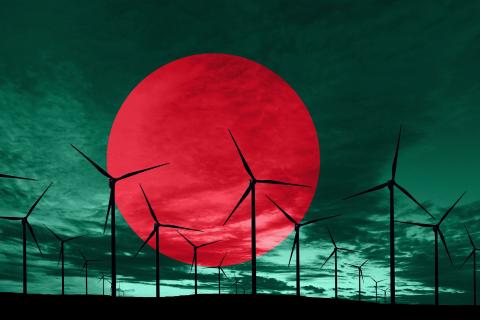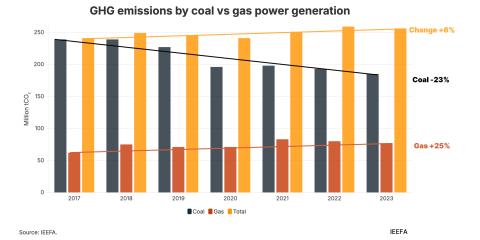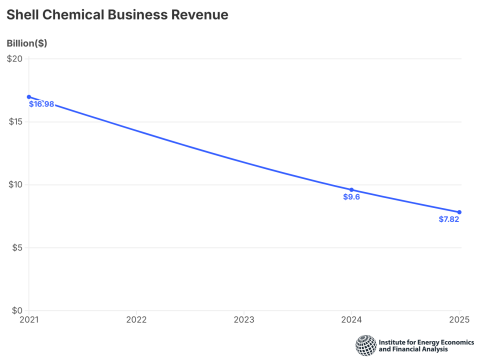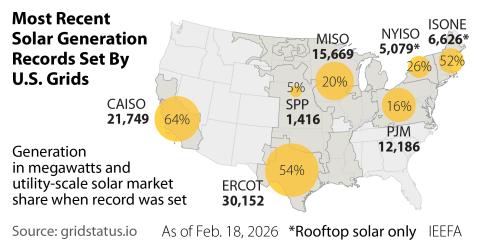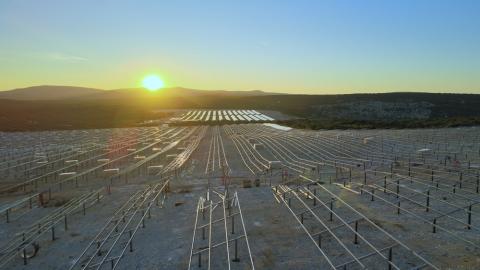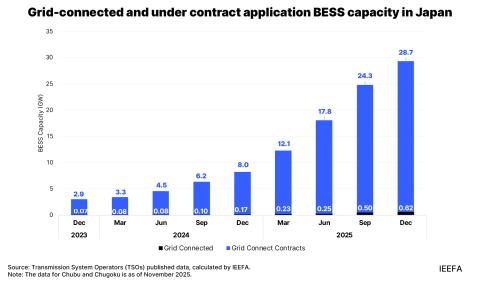Bangladesh must strive for energy efficiency amid energy security concerns
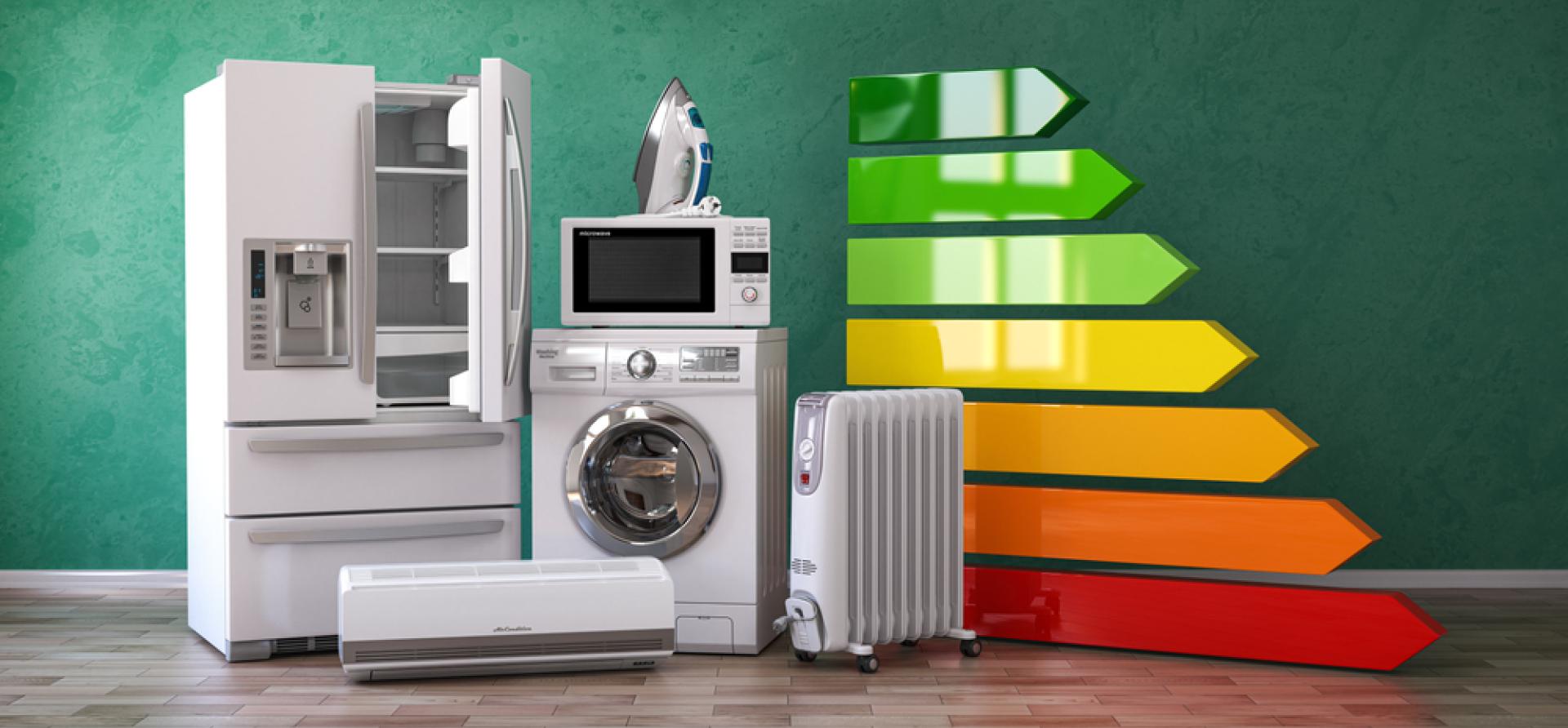
Key Findings
Local gas has propelled the economic growth of Bangladesh. However, amid high dependence on gas and limited success in local gas exploration, Bangladesh resorted to importing liquefied natural gas (LNG) in 2018.
Bangladesh must strive to increase energy efficiency and reduce wasteful energy use. But saving energy requires more than just a technological shift – people also need to change their energy consumption patterns.
The government is likely to approve the energy efficiency standards and labelling regulations soon. Since similar appliances from different suppliers are available in the market, people cannot easily choose in the absence of information on the energy efficiency standards of appliances.
On 9 August 1975, the then President of Bangladesh and father of the nation, Bangabandhu Sheikh Mujibur Rahman, bought five gas fields from Shell Oil. The nationalisation of five gas fields was the first step towards enhancing Bangladesh’s energy security. To commemorate this historic day, Bangladesh has been observing National Energy Security Day on 9 August since 2010.
Local gas has propelled the economic growth of Bangladesh. However, amid high dependence on gas and limited success in local gas exploration, Bangladesh resorted to importing liquefied natural gas (LNG) in 2018. While the international fuel market had already cautioned Bangladesh over the uncertainty of LNG prices in 2022, the country may encounter further challenges as production from local gas fields will likely plummet in a few years, making it more LNG-dependent. The country is also reeling from the shortage of coal supply.
Therefore, Bangladesh must strive to increase energy efficiency and reduce wasteful energy use. But saving energy requires more than just a technological shift – people also need to change their energy consumption patterns.
Information asymmetry also affects the implementation of energy efficiency interventions. Conducting periodic campaigns to raise awareness on energy efficiency and approval, and enforcement of energy efficiency standards and regulations could help attain the desired level of energy savings and contribute to national energy security.
Concerns over uninterrupted energy supply
In March 2023, the average gas consumption was approximately 2,890 million cubic feet per day (MMcfd), including 25% imported LNG. While a comparatively cheaper price prompted the government to increase LNG import by 76.58% in the same month, Bangladesh still experienced energy shortages. A drastic increase in local gas tariffs in January 2023 is yet to fix the supply problem.
A review of the national gas production and consumption data portends a grim future for Bangladesh unless it discovers new gas fields. Although four gas fields catered to 84% of the local demand of 2,177MMcfd in March 2023 (see figure below), these wells have already exhausted the majority of the initial reserve.
The Bibiyana gas field, which met 52% of local gas requirements alone, has a reserve of only 253 billion cubic feet (Bcf) left. Bangladesh has so far used 95% of Bibiyana’s stated reserve.
If the Bibiyana gas field runs out, local gas production will fall drastically, compelling the government to rapidly increase the share of LNG in the fuel mix. Despite the discovery of some gas wells in the last several years, incremental efforts are necessary to maintain at least the current level of local gas production.
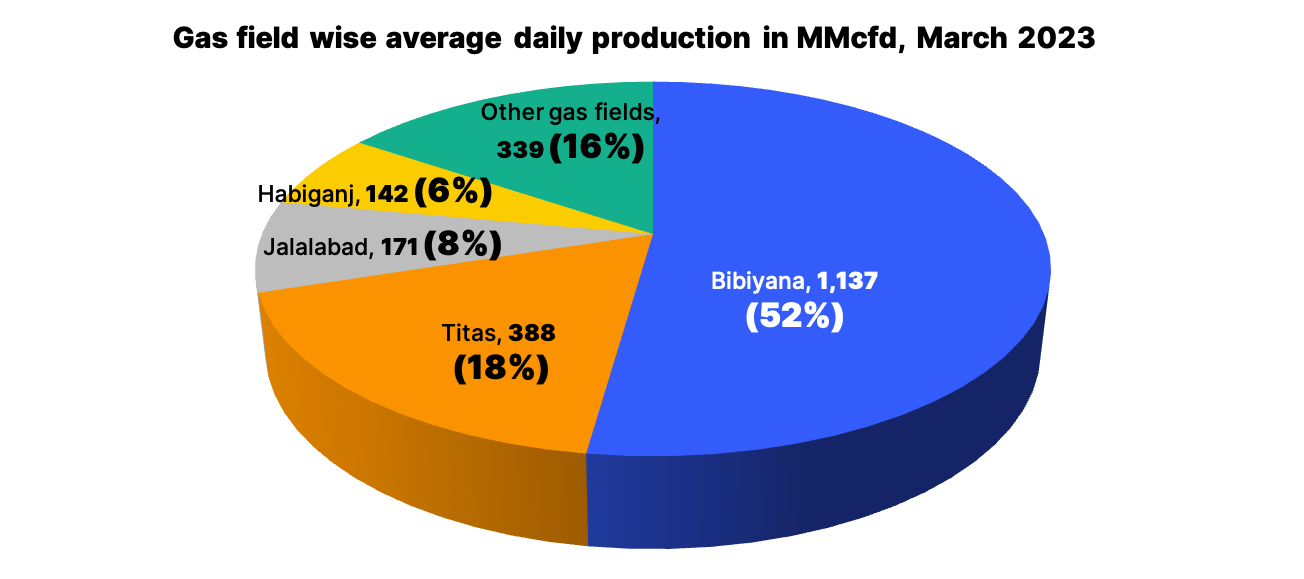
Source: Gas and Coal Reserve & Production, March 2023
Moreover, both Payra and Rampal power plants experienced temporary disruptions as a result of the high import price of coal and tight fiscal conditions, making them expensive and less reliable.
From precautionary measures to sustained energy efficiency efforts
The government’s austerity measures to address the energy crisis, such as load-shedding and gas rationing, have delivered mixed results. Many people use diesel generators during load-shedding. Given that the overall fuel supply scenario may worsen in future, the government should accelerate efforts for the sustainability of energy efficiency and conservation measures instead.
Notably, the residential sector consumes more than half of the electricity generated in the country. The energy efficiency and conservation master plan demonstrates that energy efficiency measures can reduce 35.9% of the energy used in the residential sector. For instance, lights, fans and other appliances can be replaced with energy-saving ones.
However, it is imperative to conduct nationwide campaigns to raise awareness of energy efficiency and conservation, as many people are still unaware of the benefits. They may be concerned about the prevailing energy crisis and its impact, but many may not necessarily know how small initiatives at the individual or family level could help ease pressure on national energy supply and security. Although the Sustainable and Renewable Energy Development Authority (SREDA) organises such campaigns, these events should be carried out more regularly.
The government is likely to approve the energy efficiency standards and labelling regulations soon. Since similar appliances from different suppliers are available in the market, people cannot easily choose in the absence of information on the energy efficiency standards of appliances. The enforcement of these standards and labelling regulations can help reduce information asymmetry.
Additionally, street vendors often sell substandard and cheap LED lights. This not only distorts the energy-efficient appliance market but also affects the confidence of consumers in such appliances. A regulatory mechanism to drive out inefficient appliances through periodic market monitoring can improve the situation.
The need to address rebound effects
While replacing an inefficient appliance with a new and efficient one is the standard practice to save energy, this may not necessarily reduce energy consumption to the expected level. Instead, improving energy efficiency can spur the use of multiple appliances owing to reduced energy bills. Additionally, reduced energy bills may encourage an individual or a family to purchase a new appliance for a different purpose, resulting in further energy consumption. This phenomenon is famously known as the Jevons paradox or rebound effect, first argued by economist Stanley Jevons in 1865.
There are examples of rebound effects in different countries regardless of the investment in household energy efficiency. For instance, Germany reportedly experienced no reduction in household heating demand despite its efforts and investment in energy efficiency. While people reduced heating bills as a result of better insulation, they used the money saved to keep their living rooms even warmer. Scientific literature also supports similar evidence in other countries.
Since people like to maximise their comfort, the rebound effect is not completely unintended, indicating that only technical efficiency interventions cannot ensure the desired energy savings – regulatory support is also needed. The government of Bangladesh can consider introducing a default minimum temperature for air conditioners (ACs), restricting cooling to a certain temperature. In 2020, India’s Bureau of Energy Efficiency introduced a mandatory default minimum temperature of 24° C for all-star-rated ACs. A similar attempt would be highly expedient in Bangladesh.
Of course, Bangladesh would require multipronged approaches, including renewable energy capacity expansion and local gas exploration, to enhance energy security, but it should also guide people to be more energy conscious. A holistic approach that strongly discourages unnecessary and wasteful energy consumption and shapes end-use consumption behaviour is the need of the hour.
This article was first published by The Business Standard.


